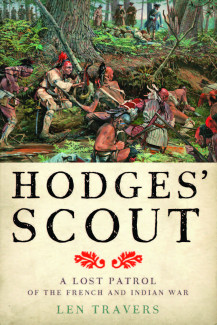
Johns Hopkins UniversityEst. 1876
America’s First Research University
Hodges’ Scout: A Lost Patrol of the French and Indian War

And some there be, which have no memorial;
As though they had never been;
And are become as though they had never been born . . .
That passage from the book of Ecclesiasticus, which begins Hodges’ Scout, came out of the blue. More honestly, it came as an offering from R. Patrick Murphy, who was attending a conference at which I was delivering a work-in-progress talk. I remember being, first, impressed with Mr. Murphy’s powers of recollection, and second, amazed that someone still read the Apocrypha. Who does that?
But it was a wonderfully appropriate epigram for my project, and indeed every historian can appreciate its simple truth. It certainly applied to the men of that doomed patrol of 1756, most of whose remains were long ago scattered about the woods near Lake George. For the handful of those who returned to their homes in New England, there may in fact be a memorial or two. Jeremiah Lincoln, taken captive at the massacre, made a daring escape from Montreal nine months later, lived to a ripe old age, and was buried in Lunenburg, Massachusetts. His neatly carved gravestone survives, but I have not located those of any others. This is not unusual; people move to other localities, records get lost, gravestones crumble with age, and many could not afford to have gravestones made. In any case, such data was not essential to the book; there comes a time when the author must pare down material, or give up on a trail that has gone cold. Finished is better than perfect.
But one survivor of Hodges’ Scout still intrigues me. William Merry was thirty-three when he was “kill’d or taken” on that September day. He was a poor laborer from Norton, Massachusetts, the same town from which hailed his commander, Captain Joseph Hodges. Merry was married, with several children and step-children; I surmised that he had been one of the many who had enlisted in a provincial regiment for the wages and bounties the colony offered. He remained a captive of the Indians at Oswegatchie until nearly the end of the war, when he too made a successful break for freedom. His homecoming was not an easy one, and there is a suggestion in the records that he may have had difficulty readjusting to civilian life – hardly surprising under the circumstances.

What made William Merry pivotal to my story was the fact that only he, out of that small group of survivors who made it home, left anything like a detailed account of what happened up to, and during, the ambush and slaughter. But there was a problem: his account was given verbally to the family of Capt. Hodges sometime after Merry had returned, and survived as family lore until, a century later, a Hodges descendant finally wrote down the version he had heard in his youth. My immediate, though reluctant, reaction was to dismiss the story: a third-hand account; a tale calculated to assuage a grieving family. I was faced with the dilemma familiar to anyone writing history: the problem of trusting memories, and in this case not simply those of William Merry. Some of the story’s melodramatic flourishes may have been added by the re-telling of the story among the Hodges family over three generations. There seemed simply no way to accept Merry’s narrative at face value.
And then, as more documents accumulated, it became clear that Merry’s story in its broad outlines, and even in its details, was in fact plausible. Preserved in the version that survived were incidental details that I could verify. Altered as the account undoubtedly was over time, it fit the facts that I had, and did not contradict other survivors’ testimony. For reasons that I hope readers will appreciate, I decided to make the last chapter of Hodges’ Scout “William Merry’s Tale,” exploring the question of how we use sources, and how, in this case at least, an old family story could hold the key to understanding a tragic event in the past.
Several years have passed since the book debuted in hardcover. New projects beckon, but I continue, in casual fashion, my search for the survivors’ after-stories, William Merry’s especially. When the War for Independence began, little more than a decade after his return, he was still willing, at age fifty-two, to enlist for short stints with Massachusetts state regiments, responding to alarms and reinforcing coastal defenses. The 1790 federal census has him living in Rochester, a town close by where I live, but so far I have found no further trace of him in local records or in the rural cemeteries. I expect no great historical revelation from any such discovery; I just hate loose ends, and I would like to think that a “memorial” for him is out there somewhere. But for nearly all the men of Hodges’ unlucky command, this book is probably the only memorial they will get.
Len Travers is a professor of history at the University of Massachusetts Dartmouth. He is the author of Hodges' Scout: A Lost Patrol of the French and Indian War, which is now available in paperback, and Celebrating the Fourth: Independence Day and the Rites of Nationalism in the Early Republic.



